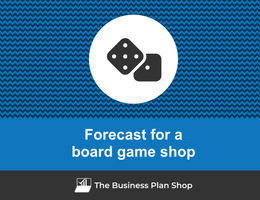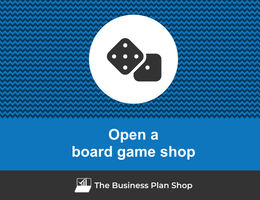How to write a business plan for a board game shop?
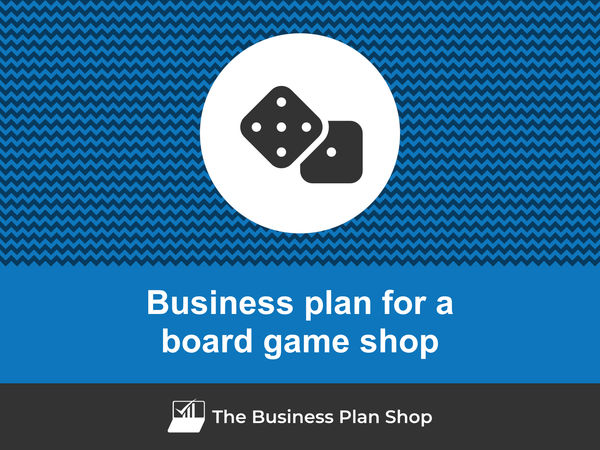
Writing a business plan for a board game shop can be an intimidating task, especially for those just starting.
This in-depth guide is designed to help entrepreneurs like you understand how to create a comprehensive business plan so that you can approach the exercise with method and confidence.
We'll cover: why writing a board game shop business plan is so important - both when starting up, and when running and growing the business - what information you need to include in your plan, how it should be structured, and what tools you can use to get the job done efficiently.
Let's get started!
Why write a business plan for a board game shop?
Being clear on the scope and goals of the document will make it easier to understand its structure and content. So before diving into the actual content of the plan, let's have a quick look at the main reasons why you would want to write a board game shop business plan in the first place.
To have a clear roadmap to grow the business
It's rarely business as usual for small businesses. The economy follows cycles where years of growth are followed by recessions, and the business environment is always changing with new technologies, new regulations, new competitors, and new consumer behaviours appearing all the time...
In this context, running a business without a clear roadmap is like driving blindfolded: it's dangerous at best. That's why writing a business plan for a board game shop is essential to create successful and sustainable businesses.
To write an effective business plan, you will need to take stock of where you are (if you are already in business) and where you want the business to go in the next three to five years.
Once you know where you want your board game shop to be, you'll have to identify:
- what resources (human, equipment, and capital) are needed to get there,
- at what pace the business needs to progress to get there in time,
- and what risks you'll face along the way.
Going through this process regularly is beneficial, both for startups and existing companies, as it helps make informed decisions about how best to allocate resources to ensure the long-term success of the business.
To anticipate future cash flows
Regularly comparing your actual financial performance to the projections in the financial forecast of your board game shop's business plan gives you the ability to monitor your business's financial health and make necessary adjustments as needed.
This practice allows you to detect potential financial issues, such as unexpected cash shortfalls before they escalate into major problems. Giving you time to find additional financing or put in place corrective measures.
Additionally, it helps you identify growth opportunities, like excess cash flow that could be allocated to launch new products and services or expand into new markets.
Staying on track with these regular comparisons enables you to make well-informed decisions about the amount of financing your business might require, or the excess cash flow you can expect to generate from your main business activities.
To secure financing
A detailed business plan becomes a crucial tool when seeking financing from banks or investors for your board game shop.
Investing and lending to small businesses are very risky activities given how fragile they are. Therefore, financiers have to take extra precautions before putting their capital at risk.
At a minimum, financiers will want to ensure that you have a clear roadmap and a solid understanding of your future cash flows (like we just explained above). But they will also want to ensure that your business plan fits the risk/reward profile they seek.
This will off-course vary from bank to bank and investor to investor, but as a rule of thumb. Banks will want to see a conservative financial management style (low risk), and they will use the information in your business plan to assess your borrowing capacity — the level of debt they think your business can comfortably handle — and your ability to repay the loan. This evaluation will determine whether they'll provide credit to your board game shop and the terms of the agreement.
Whereas investors will carefully analyze your business plan to gauge the potential return on their investment. Their focus lies on evidence indicating your board game shop's potential for high growth, profitability, and consistent cash flow generation over time.
Now that you recognize the importance of creating a business plan for your board game shop, let's explore what information is required to create a compelling plan.
Need a convincing business plan?
The Business Plan Shop makes it easy to create a financial forecast to assess the potential profitability of your projects, and write a business plan that’ll wow investors.

Information needed to create a business plan for a board game shop
You need the right data in order to project sales, investments and costs accurately in the financial forecast of your board game shop business plan.
Below, we'll cover three key pieces of information you should gather before drafting your business plan.
Carrying out market research for a board game shop
Carrying out market research before writing a business plan for a board game shop is essential to ensure that the financial projections are accurate and realistic.
Market research helps you gain insight into your target customer base, competitors, pricing strategies and other key factors which can have an impact on the commercial success of your business.
In particular, it is useful in forecasting revenue as it provides valuable data regarding potential customers’ spending habits and preferences.
You could potentially find that customers may be more interested in purchasing family-oriented board games, or that they might be drawn to games with a digital component. Market research could also reveal that customers may be more likely to purchase games that are designed for a single player, or that they could be interested in cooperative games.
This information can then be used to create more accurate financial projections which will help investors make informed decisions about investing in your board game shop.
Developing the sales and marketing plan for a board game shop
Budgeting sales and marketing expenses is essential before creating a board game shop business plan.
A comprehensive sales and marketing plan should provide an accurate projection of what actions need to be implemented to acquire and retain customers, how many people are needed to carry out these initiatives, and how much needs to be spent on promotions, advertising, and other aspects.
This helps ensure that the right amount of resources is allocated to these activities in order to hit the sales and growth objectives forecasted in your business plan.
The staffing and equipment needs of a board game shop
Whether you are at the beginning stages of your board game shop or expanding its horizons, having a clear plan for recruitment and capital expenditures (investment in equipment and real estate) is vital to ensure your business's success.
To achieve this, both the recruitment and investment plans must align coherently with the projected timing and level of growth in your forecast. It is essential to secure appropriate funding for these plans.
Staffing costs for a board game shop might include salaries for sales associates, customer service representatives, and a manager. Equipment costs might include computers for tracking inventory, chairs and tables for customers to test out games, and gaming consoles to demonstrate game play.
To create a financial forecast that accurately represents your business's outlook, remember to factor in other day-to-day operating expenses.
Now that you have all the necessary information, it's time to dive in and start creating your business plan and developing the financial forecast for your board game shop.
What goes into your board game shop's financial forecast?
The objective of the financial forecast of your board game shop's business plan is to show the growth, profitability, funding requirements, and cash generation potential of your business over the next 3 to 5 years.
The four key outputs of a financial forecast for a board game shop are:
- The profit and loss (P&L) statement,
- The projected balance sheet,
- The cash flow forecast,
- And the sources and uses table.
Let's look at each of these in a bit more detail.
The projected P&L statement
Your board game shop forecasted P&L statement enables the reader of your business plan to get an idea of how much revenue and profits your business is expected to make in the near future.

Ideally, your reader will want to see:
- Growth above the inflation level
- Expanding profit margins
- Positive net profit throughout the plan
Expectations for an established board game shop will of course be different than for a startup. Existing businesses which have reached their cruising altitude might have slower growth and higher margins than ventures just being started.
The projected balance sheet of your board game shop
The balance sheet for a board game shop is a financial document that provides a snapshot of your business’s financial health at a given point in time.
It shows three main components: assets, liabilities and equity:
- Assets: are resources owned by the business, such as cash, equipment, and accounts receivable (money owed by clients).
- Liabilities: are debts owed to creditors and other entities, such as accounts payable (money owed to suppliers) and loans.
- Equity: includes the sums invested by the shareholders or business owners and the cumulative profits and losses of the business to date (called retained earnings). It is a proxy for the value of the owner's stake in the business.
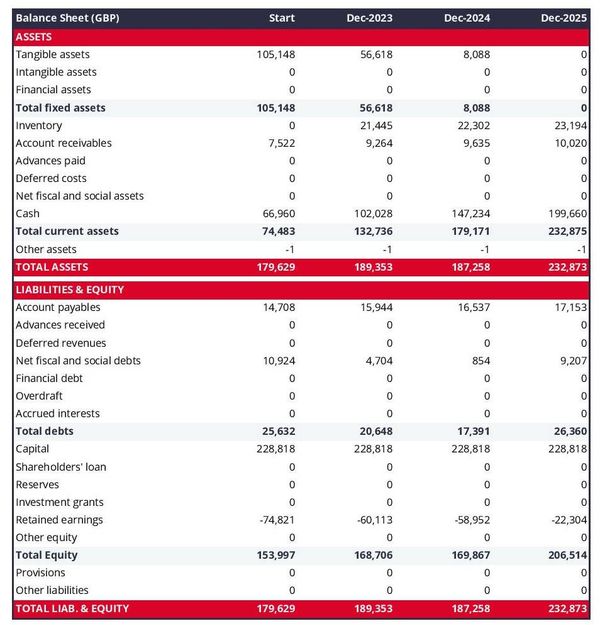
Examining the balance sheet is important for lenders, investors, or other stakeholders who are interested in assessing your board game shop's liquidity and solvency:
- Liquidity: assesses whether or not your business has sufficient cash and short-term assets to honour its liabilities due over the next 12 months. It is a short-term focus.
- Solvency: assesses whether or not your business has the capacity to repay its debt over the medium-term.
Looking at the balance sheet can also provide insights into your board game shop's investment and financing policies.
In particular, stakeholders can compare the value of equity to the value of the outstanding financial debt to assess how the business is funded and what level of financial risk has been taken by the owners (financial debt is riskier because it has to be repaid, while equity doesn't need to be repaid).
The cash flow forecast
A projected cash flow statement for a board game shop is used to show how much cash the business is generating or consuming.
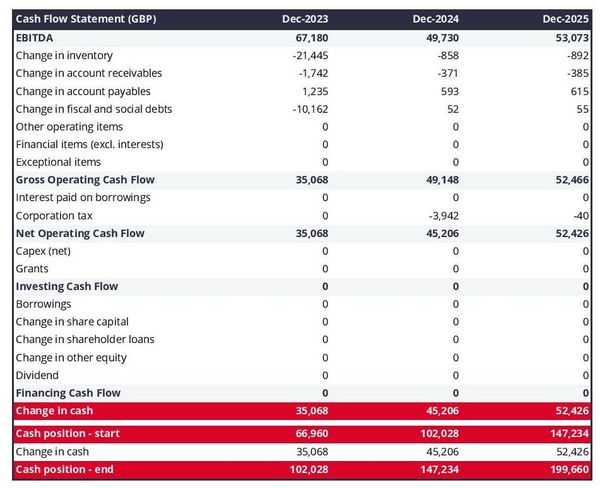
The cash flow forecast is usually organized by nature to show three key metrics:
- The operating cash flow: do the core business activities generate or consume cash?
- The investing cash flow: how much is the business investing in long-term assets (this is usually compared to the level of fixed assets on the balance sheet to assess whether the business is regularly maintaining and renewing its equipment)?
- The financing cash flow: is the business raising new financing or repaying financiers (debt repayment, dividends)?
As we discussed earlier, cash is king and keeping an eye on future cash flows an imperative for running a successful business. Therefore, you can expect the reader of your board game shop business plan to pay close attention to your cash flow forecast.
Also, note that it is customary to provide both yearly and monthly cash flow forecasts in a business plan - so that the reader can analyze seasonal variation and ensure the board game shop is appropriately funded.
The initial financing plan
The sources and uses table or initial financing plan is a key component of your business plan when starting a board game shop.
It shows where the capital needed to set up the business will come from (sources) and how it will be spent (uses).

This table helps size the investment required to set up the board game shop, and understand how risks will be distributed between the business owners, and the financiers.
The sources and uses table also highlights what the starting cash position will be. This is key for startups as the business needs to have sufficient funding to sustain operations until the break-even point is reached.
Now that you have a clear understanding of what will go into the financial forecast of your board game shop business plan, let's have a look at the written part of the plan.
Need a convincing business plan?
The Business Plan Shop makes it easy to create a financial forecast to assess the potential profitability of your projects, and write a business plan that’ll wow investors.

The written part of a board game shop business plan
The written part of a board game shop business plan is composed of 7 main sections:
- The executive summary
- The presentation of the company
- The products and services
- The market analysis
- The strategy
- The operations
- The financial plan
Throughout these sections, you will seek to provide the reader with the details and context needed for them to form a view on whether or not your business plan is achievable and your forecast a realistic possibility.
Let's go through the content of each section in more detail!
1. The executive summary
The first section of your board game shop's business plan is the executive summary which provides, as its name suggests, an enticing summary of your plan which should hook the reader and make them want to know more about your business.
When writing the executive summary, it is important to provide an overview of the business, the market, the key financials, and what you are asking from the reader.
Start with a brief introduction of the business, its name, concept, location, how long it has been in operation, and what makes it unique. Mention any services or products you plan to offer and who you sell to.
Then you should follow with an overview of the addressable market for your board game shop, current trends, and potential growth opportunities.
You should then include a summary of your key financial figures such as projected revenues, profits, and cash flows.
Finally, you should detail any funding requirements in the ask section.
2. The presentation of the company
As you build your board game shop business plan, the second section deserves attention as it delves into the structure and ownership, location, and management team of your company.
In the structure and ownership part, you'll provide valuable insights into the legal structure of the business, the identities of the owners, and their respective investments and ownership stakes. This level of transparency is vital, particularly if you're seeking financing, as it clarifies which legal entity will receive the funds and who holds the reins of the business.
Moving to the location part, you'll offer a comprehensive view of the company's premises and articulate why this specific location is strategic for the business, emphasizing factors like catchment area, accessibility, and nearby amenities.
When describing the location of your board game shop, you could emphasize the potential for success in the area. The shop may be located in a highly accessible area, with plenty of foot traffic and a large number of potential customers. The area may be known for its vibrant nightlife and entertainment options, suggesting a lively atmosphere that could draw people in. Additionally, the area may have a strong culture of board gaming, with many local tournaments and gaming stores nearby. This could help to create a welcoming environment for your board game shop and attract customers.
Lastly, you should introduce your esteemed management team. Provide a thorough explanation of each member's role, background, and extensive experience.
It's equally important to highlight any past successes the management team has achieved and underscore the duration they've been working together. This information will instil trust in potential lenders or investors, showcasing the strength and expertise of your leadership team and their ability to deliver the business plan.
3. The products and services section
The products and services section of your board game shop business plan should include a detailed description of what your company sells to its customers.
For example, your board game shop might offer a wide selection of board games and puzzles, from classic titles to new releases. It could also provide custom game pieces and accessories to help bring the game to life. Finally, you could offer gaming events, such as tournaments and game nights, to provide an interactive and entertaining experience for customers.
The reader will want to understand what makes your board game shop unique from other businesses in this competitive market.
When drafting this section, you should be precise about the categories of products or services you sell, the clients you are targeting and the channels that you are targeting them through.
4. The market analysis
When you present your market analysis in your board game shop business plan, it's crucial to include detailed information about customers' demographics and segmentation, target market, competition, barriers to entry, and any relevant regulations.
The main objective of this section is to help the reader understand the size and attractiveness of the market while demonstrating your solid understanding of the industry.
Begin with the demographics and segmentation subsection, providing an overview of the addressable market for your board game shop, the key trends in the marketplace, and introducing different customer segments along with their preferences in terms of purchasing habits and budgets.
Next, focus on your target market, zooming in on the specific customer segments your board game shop aims to serve and explaining how your products and services fulfil their distinct needs.
For example, your target market might include adults aged 25-35 who enjoy playing tabletop games with friends. They likely have a disposable income and are willing to invest in a variety of board games. This type of customer likes the social aspect of playing board games and often spends time in a board game shop to find new games to try.
Then proceed to the competition subsection, where you introduce your main competitors and highlight what sets you apart from them.
Finally, conclude your market analysis with an overview of the key regulations applicable to your board game shop.
5. The strategy section
When crafting the strategy section of your business plan for your board game shop, it's important to cover several key aspects, including your competitive edge, pricing strategy, sales & marketing plan, milestones, and risks and mitigants.
In the competitive edge subsection, clearly explain what sets your company apart from competitors. This is particularly critical if you're a startup, as you'll be trying to establish your presence in the marketplace among entrenched players.
The pricing strategy subsection should demonstrate how you aim to maintain profitability while offering competitive prices to your customers.
For the sales & marketing plan, outline how you plan to reach and acquire new customers, as well as retain existing ones through loyalty programs or special offers.
In the milestones subsection, detail what your company has achieved thus far and outline your primary objectives for the coming years by including specific dates for expected progress. This ensures everyone involved has clear expectations.
Lastly, in the risks and mitigants subsection, list the main risks that could potentially impact the execution of your plan. Explain the measures you've taken to minimize these risks. This is vital for investors or lenders to feel confident in supporting your venture - try to proactively address any objection they might have.
Your board game shop may face risks related to theft and vandalism. While you may take preventive measures such as installing a security system or hiring a security guard, you could still experience a theft or a break-in. Additionally, your shop may be at risk of losing customers due to price competition with other board game shops or online retailers. You may offer competitive pricing, but customers might find other shops or online retailers with even lower prices.
6. The operations section
In your business plan, it's also essential to provide a detailed overview of the operations of your board game shop.
Start by covering your team, highlighting key roles and your recruitment plan to support the expected growth. Outline the qualifications and experience required for each role and your intended recruitment methods, whether through job boards, referrals, or headhunters.
Next, clearly state your board game shop's operating hours, allowing the reader to assess staffing levels adequately. Additionally, mention any plans for varying opening times during peak seasons and how you'll handle customer queries outside normal operating hours.
Then, shift your focus to the key assets and intellectual property (IP) necessary for your business. If you rely on licenses, trademarks, physical structures like equipment or property, or lease agreements, make sure to include them in this section.
You might have key assets such as a store front, employees, suppliers, customers, and inventory. You could also have Intellectual Property such as trademarks and copyrights on your products and services. These assets and IP could help you build a strong brand identity and protect it, while also helping you establish business relationships and supply chains.
Lastly, include a list of suppliers you plan to work with, detailing their services and main commercial terms, such as price, payment terms, and contract duration. Investors are interested in understanding why you've chosen specific suppliers, which may be due to higher-quality products or established relationships from previous ventures.
7. The presentation of the financial plan
The financial plan section is where we will present the financial forecast we talked about earlier in this guide.
Now that you have a clear idea of what goes in your board game shop business plan, let's look at the solutions you can use to draft yours.
What tool should I use to write my board game shop's business plan?
In this section, we will be reviewing the two main solutions for creating a board game shop business plan:
- Using specialized online business plan software,
- Outsourcing the plan to the business plan writer.
Using an online business plan software for your board game shop's business plan
The modern and most efficient way to write a board game shop business plan is to use business plan software.
There are several advantages to using specialized software:
- You can easily create your financial forecast by letting the software take care of the financial calculations for you without errors
- You are guided through the writing process by detailed instructions and examples for each part of the plan
- You can access a library of dozens of complete business plan samples and templates for inspiration
- You get a professional business plan, formatted and ready to be sent to your bank or investors
- You can easily track your actual financial performance against your financial forecast
- You can create scenarios to stress test your forecast's main assumptions
- You can easily update your forecast as time goes by to maintain visibility on future cash flows
- You have a friendly support team on standby to assist you when you are stuck
If you're interested in using this type of solution, you can try The Business Plan Shop for free by signing up here.
Need a convincing business plan?
The Business Plan Shop makes it easy to create a financial forecast to assess the potential profitability of your projects, and write a business plan that’ll wow investors.

Hiring a business plan writer to write your board game shop's business plan
Outsourcing your board game shop business plan to a business plan writer can also be a viable option.
These writers possess valuable experience in crafting business plans and creating accurate financial forecasts. Additionally, enlisting their services can save you precious time, enabling you to concentrate on the day-to-day operations of your business.
It's important to be mindful, though, that hiring business plan writers comes with a cost. You'll be paying not just for their time but also for the software they use, and their profit margin.
Based on experience, a complete business plan usually requires a budget of at least £1.5k ($2.0k) excluding tax, and more if revisions are needed after initial meetings with lenders or investors - changes often arise following these discussions.
When seeking investment, be cautious about spending too much on consulting fees. Investors prefer their funds to contribute directly to business growth. Thus, the amount you spend on business plan writing services and other consulting services should be negligible compared to the amount you raise.
Another aspect to consider is that while you'll receive the output of the business plan, you usually won't own the actual document. It will be saved in the consultant's business plan software, which will make updating the plan challenging without retaining the consultant on a retainer.
Given these factors, it's essential to carefully weigh the pros and cons of outsourcing your board game shop business plan to a business plan writer and decide what best suits your business's unique needs.
Why not create your board game shop's business plan using Word or Excel?
I must advise against using Microsoft Excel and Word (or their Google, Apple, or open-source equivalents) to write your board game shop business plan. Let me explain why.
Firstly, creating an accurate and error-free financial forecast on Excel (or any spreadsheet) is highly technical and requires a strong grasp of accounting principles and financial modelling skills. It is, therefore, unlikely that anyone will fully trust your numbers unless you have both a degree in finance and accounting and significant financial modelling experience, like us at The Business Plan Shop.
Secondly, relying on spreadsheets is inefficient. While it may have been the only option in the past, technology has advanced significantly, and software can now perform these tasks much faster and with greater accuracy. With the rise of AI, software can even help us detect mistakes in forecasts and analyze the numbers for better decision-making.
And with the rise of AI, software is also becoming smarter at helping us detect mistakes in our forecasts and helping us analyse the numbers to make better decisions.
Moreover, software makes it easier to compare actuals versus forecasts and maintain up-to-date forecasts to keep visibility on future cash flows, as we discussed earlier in this guide. This task is cumbersome when using spreadsheets.
Now, let's talk about the written part of your board game shop business plan. While it may be less error-prone, using software can bring tremendous gains in productivity. Word processors, for example, lack instructions and examples for each part of your business plan. They also won't automatically update your numbers when changes occur in your forecast, and they don't handle formatting for you.
Overall, while Word or Excel may seem viable for some entrepreneurs to create a business plan, it's by far becoming an antiquated way of doing things.
Takeaways
- Using business plan software is a modern and cost-effective way of writing and maintaining business plans.
- A business plan is not a one-shot exercise as maintaining it current is the only way to keep visibility on your future cash flows.
- A business plan has 2 main parts: a financial forecast outlining the funding requirements of your board game shop and the expected growth, profits and cash flows for the next 3 to 5 years; and a written part which gives the reader the information needed to decide if they believe the forecast is achievable.
We hope that this in-depth guide met your expectations and that you now have a clear understanding of how to write your board game shop business plan. Do not hesitate to contact our friendly team if you have questions additional questions we haven't addressed here.
Also on The Business Plan Shop
- How to write a business plan to secure a bank loan?
- R&D in business plans
- Business plans vs internal plans
- 3-year business plan
- Key steps to write a business plan?
- Top mistakes to avoid in your business plan
Do you know entrepreneurs interested in starting or growing a board game shop? Share this article with them!


